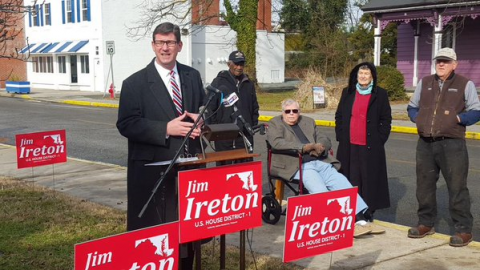
A comparatively modest gathering stood by Salisbury City Councilman (and former mayor) Jim Ireton as he embarked on his quest to unseat current Congressman Andy Harris in Maryland’s First Congressional District. And his opening salvo naturally was critical of the incumbent:
I’m here (in Crisfield) today because the 1st District needs a Congressman who won’t just say no and vote no. In just 6 years in Washington, Andy Harris has done nothing for the people of the 1st District.
Crisfield, the southernmost city in Maryland, was chosen by Ireton because it was hit hard in 2012 by Hurricane Sandy, with Ireton contending it has not recovered. Jim chastised the incumbent because “he voted against $9.7 billion in hurricane relief.”
So I did a little research. It turns out the $9.7 billion bill Harris voted against was a measure to extend the borrowing authority for FEMA. Harris later voted against the overall supplemental appropriations bill but supported a substitute which would have offset $17 billion in approved aid by making other cuts (making it budget-neutral.) He ended up voting for a different appropriations bill that improved the original but did not clear the Senate. You may recall many were concerned about the budgetary impact in that era of sequestration.
Ireton went on about how Harris doesn’t support farmers and voted multiple times to repeal Obamacare before stepping boldly into Jim Crow territory.
He wants to return us to the days of insurance companies legally discriminating against Americans. Just like landlords in the 1950s could tell a black family no, and do so legally, Andy Harris wants to give insurance companies the legal right to say no to people with pre-existing medical conditions.
I think Jim forgets that insurance companies are like any other business as they need to be profitable to survive. Then again, that can be expected of a mayor who enacted the “rain tax” in Salisbury and decided landlords shouldn’t charge what he considered excessive rent.
And in the department of “it takes two to tango”:
From here on, it’s going to get ugly – Andy Harris will make sure of that. He will attack me as a person, and attack the issues you care about. He will issue dire warnings about taxes, even though I have a record of cutting fees as the mayor of Salisbury. He will issue dire warnings about crime, even though Salisbury’s Part I Violent Crimes dropped every year I was in office, and dropped almost 50% over my 6 years as mayor. He will try and scare farmers, even though the Wicomico River is now healthier than it’s been in decades due to the work of the city while I was in office. And I can only imagine what he will make up to say about me personally. (Emphasis mine.)
I noted back in October when the rent stabilization program was bounced out of City Council that Ireton is in a catbird seat of sorts. During the next 9 1/2 months, assuming he wins the primary – and he is the prohibitive favorite given the field – Ireton can take credit for all of the city’s successes by saying that he initiated them as mayor, yet any failures will see Jake Day thrust in front of the nearest Shore Transit vehicle. I figured that Jim was simply using the office to cool his heels for a later political run, but my error was in assuming that he’d have the decency to at least wait until the results became official before jumping into his next campaign, not spill the beans on election night. (Had he upset just 33 of his prospective voters enough to make them change their minds. he would have had a lot more time to run.)
Harris now has a challenge from both the Democrat and Republican sides, with both being uncommonly well-known entities. It’s the first time he’s had elected officials against him since he took office in 2011. And it already is ugly with push polls and charges of not doing his job, so we’re already on the glide path to a nasty campaign.


 I put together a few things this week, and what’s apparent to me is that the political world doesn’t really take a break in August.
I put together a few things this week, and what’s apparent to me is that the political world doesn’t really take a break in August.